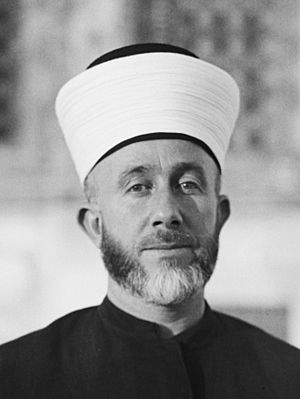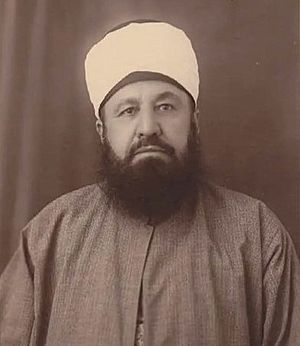Amin al-Husseini facts for kids
Quick facts for kids Amin al-Husseini |
|
|---|---|

Amin al-Husseini (1929)
|
|
| Religion | Islam |
| Denomination | Sunni |
| School | Hanafi |
| Personal | |
| Born | c. 1895–97 Jerusalem, Ottoman Syria |
| Died | 4 July 1974 Beirut, Lebanon |
| Religious career | |
| Profession | Mufti |
| Grand Mufti of Jerusalem (in office 1921–1948) | |
| In office 1921–1937 |
|
| Preceded by | Kamil al-Husayni |
| Succeeded by | Hussam ad-Din Jarallah |
| President of the Supreme Muslim Council | |
| In office 9 January 1922 – 1937 |
|
| Preceded by | Post established: President of the Supreme Muslim Council |
| President of All-Palestine | |
| In office September 1948 – 1953 |
|
| Preceded by | Post established |
| Succeeded by | Post disbanded |
| Military service | |
| Allegiance |
|
Amin al-Husseini (Arabic: أمين الحسيني, romanized: ʾAmīn al-Ḥusaynī born around 1897 – died 4 July 1974) was an important Palestinian Arab nationalist and Muslim leader. He lived in a region called Mandatory Palestine during his time.
Contents
Understanding Amin al-Husseini's Life
Amin al-Husseini was born in Jerusalem around 1897. His father, Tahir al-Husayni, was also a mufti (a Muslim legal expert) in Jerusalem. His family was well-known and traced their history back to Husayn ibn Ali, a grandson of the Islamic prophet Muhammad.
Early Education and Military Service
Al-Husseini studied at different schools, including Islamic, Ottoman, and Catholic schools. In 1912, he went to Cairo to study at an Islamic school. There, he learned from a famous Islamic scholar named Muhammad Rashid Rida.
After two years of study, he joined the Ottoman army and fought in World War I. When the war ended, he moved to Damascus. He supported the idea of an Arab Kingdom of Syria.
Return to Jerusalem and Political Role
After a war between France and Syria, al-Husseini returned to Jerusalem. From 1920, he actively opposed Zionism, which was a movement to create a Jewish homeland in Palestine. He was a leader in the 1920 Nebi Musa riots, which were protests in Jerusalem.
He was sentenced to ten years in prison for his role in the protests but was later pardoned by the British. In 1921, the British High Commissioner, Herbert Samuel, appointed him as the Grand Mufti of Jerusalem. This was a very important religious position. He used this role to promote Islam and was seen as an ally by the British until 1936.
Al-Husseini's Actions During World War II
Al-Husseini's opposition to the British grew stronger during the 1936–1939 Arab revolt in Palestine. In 1937, he left Palestine to avoid arrest. He went to Lebanon, then Iraq, and eventually ended up in Fascist Italy and Nazi Germany.
Working with Axis Powers
During World War II, Amin al-Husseini worked with both Italy and Germany. He made radio broadcasts that spread their ideas. He also helped the Nazis find and recruit Bosnian Muslims to join the Waffen-SS, a military branch of the Nazi party. He believed they shared similar values.
He even met with Adolf Hitler, the leader of Nazi Germany. During this meeting, al-Husseini asked Hitler to support Arab independence. He also wanted help to stop the creation of a Jewish national home in Palestine.
After the War
When World War II ended, al-Husseini was protected by the French. He then went to Cairo to avoid being charged with war crimes.
Before the 1948 Palestine war, al-Husseini was against the 1947 UN Partition Plan, which suggested dividing Palestine. He also opposed King Abdullah I's plan to add the Arab part of Palestine to Jordan. He created his own group called al-jihad al-muqaddas.
In September 1948, he helped set up an All-Palestine Government. This government was based in Gaza, which was controlled by Egypt. Some Arab states recognized it, but it was later dissolved in 1959. After the war, al-Husseini lost much of his political power.
He passed away in Beirut, Lebanon, in July 1974.
Amin al-Husseini's Legacy
Amin al-Husseini is still a very talked-about person today. Some people see him as a nationalist (someone who strongly supports their nation). Others see him as an antisemite (someone who dislikes or discriminates against Jewish people). Many believe he was a mix of both.
Interesting Facts About Amin al-Husseini
- When he was in school, he learned to speak Turkish and French.
- At the age of 16, al-Husseini traveled with his mother to Mecca. This journey earned him the special title of Hajji, which is given to Muslims who complete the pilgrimage to Mecca.
See also
 In Spanish: Amin al-Husayni para niños
In Spanish: Amin al-Husayni para niños
- Palestinian nationalism
- Palestinian political violence
- Relations between Nazi Germany and the Arab world
- Collaboration with the Axis Powers during World War II
 | Jackie Robinson |
 | Jack Johnson |
 | Althea Gibson |
 | Arthur Ashe |
 | Muhammad Ali |


